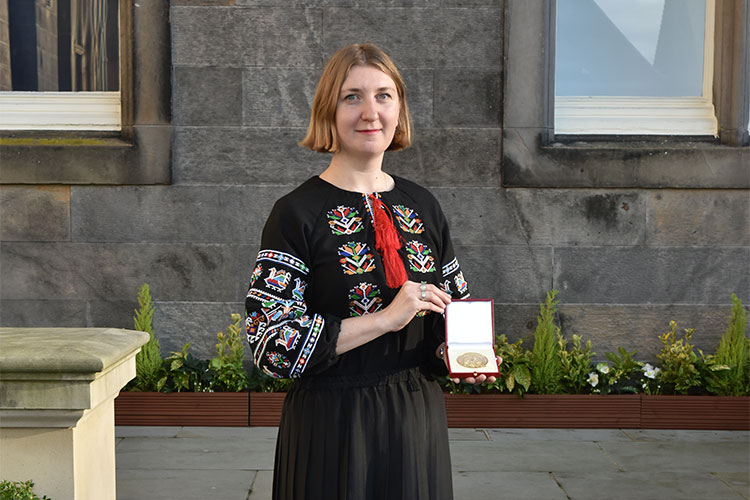Principal's Medal - Darya Tsymbalyuk

I would now like to introduce the Principal’s Medal. This award was inaugurated 13 years ago with a gift from three anonymous donors and is supported by Ede and Ravenscroft, believed to be the oldest firm of tailors and robe-makers in the world. The award of the Principal’s Medal recognises students who display exceptional endeavour and achievement during their time at St Andrews. The awards are open to final-year undergraduates and postgraduates in any discipline, and the achievements celebrated are both academic and extracurricular.
For this academic year, the Principal’s Medal is being awarded to two truly outstanding students. Today we recognise Darya Tsymbalyuk, who graduated with a PhD in June of this year.
Darya is, first and foremost, a formidable scholar. After graduating magna cum laude in 2013 from Kenyon College, Ohio, she pursued an Erasmus Mundus Master’s programme, studying between the University of St Andrews and universities in Italy and France. She graduated from this programme in 2017 within the top one per cent of her class and, happily, decided to join us here in St Andrews to undertake a research study entitled Multispecies ruptures: stories of displacement and human-plant relations from Donbas, Ukraine. This thesis passed as highly commended with no corrections in December 2021.
Darya’s academic excellence has been recognised with a number of prestigious scholarships and awards, including a full scholarship from Kenyon College for the UWC Scholars Programme; a full scholarship from the European Commission for the Erasmus Mundus MA programme in 2015; and three years of full PhD funding with the Douglas and Gordon Bonnyman Scholarship and the School of Modern Languages Postgraduate Research Scholarship.
Not only is Darya an outstanding scholar, she is also a practising artist. One of the non-academic projects that she pursued simultaneously with her studies at St Andrews is Donbas Odyssey, a participatory art project that uses methods of mental mapping to tell stories of displacement from Donbas. She also worked collaboratively on a docufiction animation film based on her research called Displaced Garden, which secured funding from Ukrainian State Cinema Agency in 2020 and is now in production.
Darya selflessly devotes herself to important causes and civic activism. She has tirelessly campaigned for humanitarian aid for Ukraine and has spoken publicly about the various ways in which we can help her country during this time of conflict. She has written and published articles in leading journals and was instrumental in reviving the Ukrainian Society here at the University for the support of her fellow Ukrainian students during this unsettling time. On top of all of this, she also volunteered during her time here to help with wider community initiatives such as helping with group activities for people with dementia in the local area.
All of these outstanding achievements are a testament to her intellectual acumen, tremendous hard work, and immensely engaged and engaging character. Her nominators conclude that Darya is ‘quite simply the most outstanding PhD student we have encountered during our time teaching at Oxford, Exeter, Swarthmore, and St Andrews’. High praise indeed, and very well deserved. And I am pleased to say Darya is continuing her academic career and is now undertaking a postdoctoral fellowship at St Antony's College, Oxford, a world-renowned centre for research and teaching on global and regional issues.
Darya, in recognition of your superlative accomplishments during your time as a postgraduate student here at St Andrews, it gives me great pleasure to bestow upon you the Principal’s Medal.
Professor Dame Sally Mapstone FRSE
Principal and Vice-Chancellor of the University of St Andrews
Darya Tsymbalyuk, PhD
- Website: daryatsymbalyuk.com
- Twitter: @DaryaTsymbalyuk
Projects
- Multispecies ruptures: stories of displacement and human-plant relations from Donbas, Ukraine
- Donbas Odyssey
- Displaced Garden
- A postdoctoral fellowship at St Antony's College, Oxford